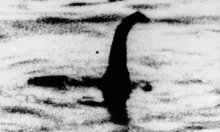Loch Ness Monster and evolution
 Pointing out the errors in creationist literature may seem to have more than a faint whiff of a fish-barrel-shooting situation about it, but what tends to fascinate me more about these mistakes and canards (after the tooth-grinding rage has subsided) is what it implies for how people think about evolution and palaeontology. The goal, presumably at least, for these people is to convince their followers and those who might be swayed, that they have a real case for creationism and/or against evolution. As such, the areas they are going to target are likely to be things that people misunderstand, or don't know and appreciate already, and so can be convinced in spite of the scientific data. Even they no longer pursue lines of argument such as all fossils being forgeries because it is so transparently the case that there are millions of them and that they are real and are easily found by anyone who searches in the right places. In short, creationist claims can somewhat ironically tell us as science educators about areas we might improve upon. And so to the story that prompted the headline: as reported earlier this week, a textbook in Louisiana aimed at Christians claims that the Loch Ness monster (a dinosaur apparently) is alive and well, and that this disproves evolution.
Pointing out the errors in creationist literature may seem to have more than a faint whiff of a fish-barrel-shooting situation about it, but what tends to fascinate me more about these mistakes and canards (after the tooth-grinding rage has subsided) is what it implies for how people think about evolution and palaeontology. The goal, presumably at least, for these people is to convince their followers and those who might be swayed, that they have a real case for creationism and/or against evolution. As such, the areas they are going to target are likely to be things that people misunderstand, or don't know and appreciate already, and so can be convinced in spite of the scientific data. Even they no longer pursue lines of argument such as all fossils being forgeries because it is so transparently the case that there are millions of them and that they are real and are easily found by anyone who searches in the right places. In short, creationist claims can somewhat ironically tell us as science educators about areas we might improve upon. And so to the story that prompted the headline: as reported earlier this week, a textbook in Louisiana aimed at Christians claims that the Loch Ness monster (a dinosaur apparently) is alive and well, and that this disproves evolution.
Naturally I won't even bother with the idea that the Loch Ness monster is real, or, if it were, that it was a dinosaur (they didn't live in water). There's a myriad of awfulness in the few reproduced lines from this book (as reported here for example) and each one seems to be the kind of thing that has been thrown at scientists for generations and some of it as "evidence" would embarrass the average delegate at a tinfoil hat convention. But really the crux of the claim is the concept that a species surviving long after it should have gone extinct according to the fossil record is somehow evidence against evolution.
I find it odd that this point should keep surviving as alleged ammunition for the creationist cause because it seems so irrelevant to the claims at hand. I assume the idea is that if the fossil record is good enough to provide evidence for evolution, and palaeontologists say an animal group has died out, and then it is found alive, then maybe the fossil record isn't so great after all. That that fossil record is far from great in many ways is no news to palaeontologists. It's an imperfect record of the past with various biases and issues built into its very nature. Understanding, appreciating and unravelling those biases helps us make the best of what fossils we do have and the rocks in which they appear. Some species preserve better than others through being more common, or having many hard parts like bones or a shell, or living in places where burial is common. Quite simply, if a species is not fossilised, we can't find it and if it was rarely fossilised we probably won't find it.
бэтбум
You might also like







